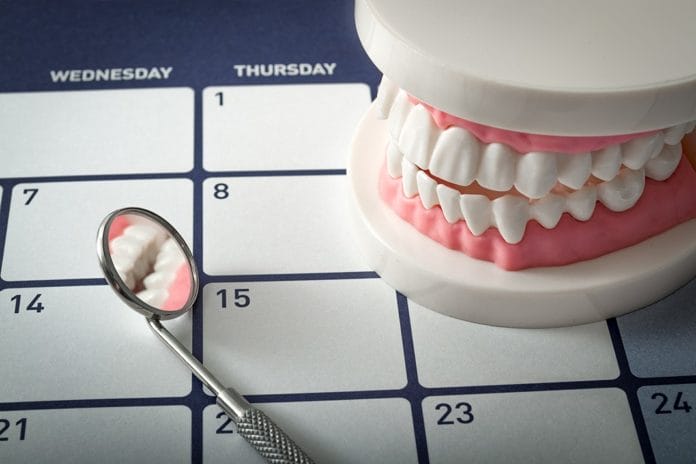I think since the dawn of civilization, there has been a problem in dental offices that has yet to be solved. Come on! You know what I’m talking about! Keeping the dental hygiene schedules full and productive!
You can seemingly have the perfect day scheduled when you begin the day fresh-faced at 8 a.m. But, by 9 o’clock, you have two cancellations that negatively impact your day, office productivity, and your pocketbook. No-shows or last-minute cancellations are one of the biggest problems that plague most dental offices. What steps can be taken to help minimize these major impositions that result in downtime for hygienists?
First, look at your current active patients (active being people who have had treatment in the past 18 months). As an example, it takes anywhere from 800 to 1,000 active patients to keep one full-time hygienist busy. If a hygienist works 180 days per year and sees an average of eight patients per day, that’s 1,440 appointment slots. This means 720 people could get appointments (1,440 divided by two when patients come in twice annually).
This does not take into account periodontal maintenance, new patients, sealants, and scaling and root planing patients. But it is a great starting point to make sure you have the patient load to support the hygiene schedule. If all the numbers work out, and there are enough patients for the hygiene team, then it’s time to work on making sure those patients make it to their scheduled appointments. Determining whether the patient will commit and show up to their appointment depends on how it’s scheduled initially, as well as the value the patient places on the upcoming appointment.
Establishing value
First, the patient must value their appointment in order to be motivated enough to keep it. Patients are likely to return by how they feel and how they are treated when they are at your office. Delivering exceptional customer service is key to helping the patient feel valued and making them want to return.
Referring to their hygiene appointment as “just a cleaning” minimizes the importance of the appointment. References to the patient’s specific needs will help to instill importance and value for the upcoming appointment. Refer to periodontal maintenance appointments as such. Refer to scaling and root planing as therapeutic appointments to address the disease process. Be sure to explain to the patient that, when they return, any specific concerns will be reviewed such as, for example, that inflamed area, craze line on #19, that sensitivity with #6, and so on.
Positive feedback is also motivation for patients to return. When the patient is being encouraged about how they have achieved better plaque control, reduced BOP, or pocket depths, it can be the stimulus needed to encourage the patient to keep their appointment.
Finding the right time
I am also a huge advocate of prescheduling patients for their needed three-, four-, or six-month recalls and have personally seen success with this protocol. Fewer patients tend to fall through the cracks when the hygienist or assistant pre-appoint. The schedule is also tailored more accurately for the procedures and time needed.
Always give the patient two options when scheduling such as: Do you prefer early in the week or later? Mornings or afternoons? Letting the patient be in control (to some degree) of the desired date and time for their return visit helps to create the expectation that the patient has made the appointment with the intention of keeping it.
If the office has a certain protocol (and I hope you do), explain that they will receive a courtesy call, text, or email closer to the appointment. The confirmed appointment places the responsibility of keeping that appointment on the patient.
The courtesy reminders, whether a postcard, text, email, or phone call, are also a great tool for helping patients to keep their hygiene appointments. You may need to make some wise judgments with prescheduling, remembering to not fill every available appointment in the needed month, leaving places for new patients, sealants, etc.
Be genuinely concerned when…
Even with the above parameters, there will be those patients who call at the last minute to cancel or reschedule their hygiene appointments. Some reasons are totally legitimate, and, as providers, we need to realize that. A sick child, death in the family, car accident, unexpected illness, etc., are all legitimate reasons for canceling an appointment, and I implore you to use your heart when talking and dealing with such patients.
For the others who call the night before or 10 minutes prior to the appointments to cancel, verbal skills are essential in trying to retain those appointments and helping the patient realize the impact that has for their own oral health. Dental practices hate no shows and cancellations because they kill our profitability.
So, what you say to patients when they call to cancel is vital to shaping how they view their dental appointment and their oral health. Always react with genuine concern when a patient calls last minute to cancel. Explain that the hygienist has that time reserved only for them and was looking forward to their appointment to review their periodontal condition, tooth that needs treatment, etc. Always ask if there is any way the office can help them keep that reserved appointment.
If the patient still wants to cancel, always try to reschedule the patient (unless they are a habitual appointment breaker) while you still have them on the phone. If the next appointment is more than four to six weeks away, the patient may decide they do not want to wait that long and come in for their already scheduled appointment. This helps build value if they realize that the office is busy, and appointments are hard to get. I use this next tactic with caution, though, because it can backfire with some patients.
If your office has a broken appointment fee, that can be a motivator in trying to have the patient keep the appointment. Some patients cringe at the thought of paying that fee and will keep their appointment when reminded of it. If it is the first time the patient has canceled at the last minute, the staff can simply state that the broken appointment fee will be waived for this one appointment, but then suggest rescheduling on a day that will not conflict with the patient’s other responsibilities. Plant the seed for keeping appointments in the future to avoid the fee.
Inevitably, even with our best efforts, holes will still pop up on the schedule from time to time because of … life! For those instances, I say stick to the tried-and-true methods of using the short notice call list and ASAP list. Normally, the responsibility falls to the front desk or a dedicated hygiene coordinator. But have the hygienist make the calls if he or she has downtime; that personal call sends a strong message to patients about their oral health.
Also, look at the schedule for the day to see if there are any past due patients. Attempt to move them over to the open spot if they agree to treatment. Look for family members of other patients scheduled around that same time who are due and might like to arrive together. Offer to see the doctor’s patients who may need same-day services such as scaling/root planing on a new patient, sealants, fluoride placement, or impressions for whitening.
Make every effort to be in control of your hygiene schedule rather than the schedule controlling you. Best wishes for keeping a full and productive hygiene schedule!
Before you leave, check out the Today’s RDH self-study CE courses. All courses are peer-reviewed and non-sponsored to focus solely on pure education. Click here now.
Listen to the Today’s RDH Dental Hygiene Podcast Below:












